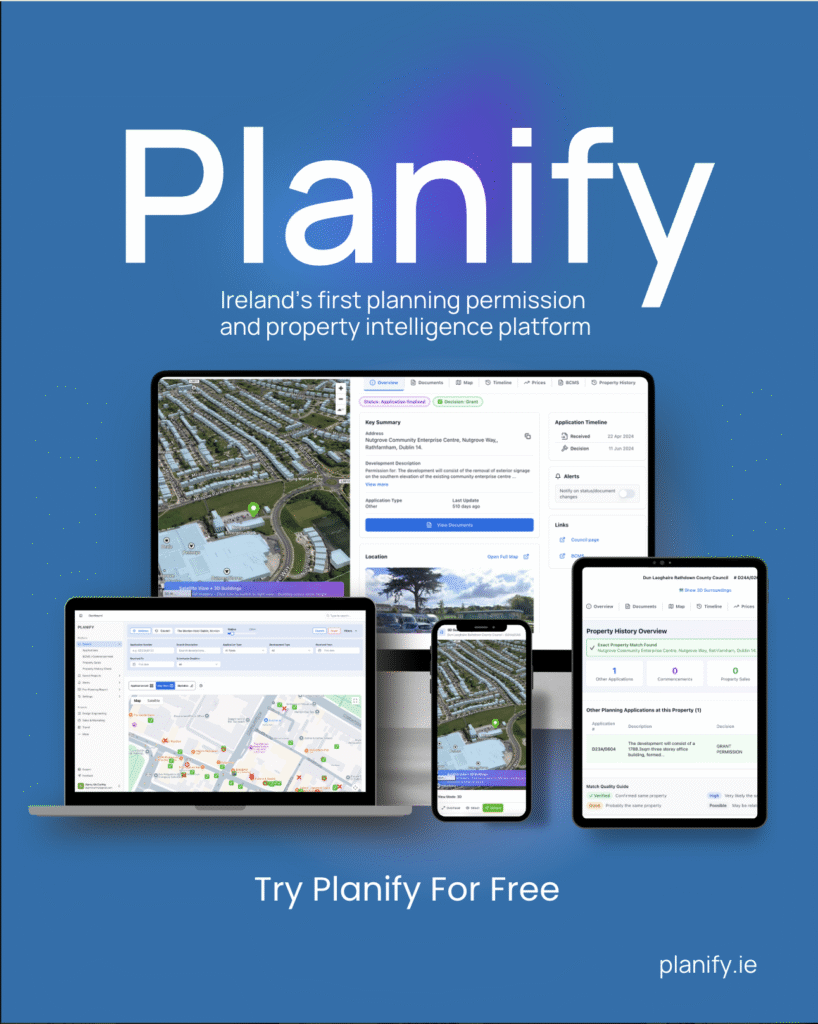Getting Started
with Planning Permission in Ireland
Advice varies greatly depending on who you speak to or which article you read. Our aim is for your information gathering journey to start and end here.

Contents
Introduction
Embarking on a project that requires planning permission in Ireland involves navigating a comprehensive system designed to logically organise development types and locations. Whether it’s building a new house, extending your property, or initiating a development project, understanding the planning permission process is essential.
Understanding Planning Permission
Planning permission in Ireland is a regulatory process required for most building and development activities. It is overseen by local authorities and is designed to prevent inappropriate building and developments, ensuring that all construction complies with local planning and environmental guidelines.
Key Steps to Begin the Planning Permission Process
1. Research and Understand Local Authority Regulations:
Check out our pages on “Development Plans and Planning Authorities” here. Embarking on a project that requires planning permission in Ireland involves navigating a comprehensive system designed to logically organise development types and locations. Whether it’s building a new house, extending your property, or initiating a development project, understanding the planning permission process is essential.
2. Zoning Considerations:
As part of the development plan, local authorities issue maps showing various zoning designations. These zoning maps dictate the type of development permissible in different areas. For example, residential areas are typically segregated from heavy industrial operations or recreational spaces. A useful tool for checking zoning designations is myplan.ie, where you can check the zoning of any address in Ireland.
3. Planning Application Requirements:
Before applying for planning permission, it’s important to understand the types of planning permission available:
- Full Permission: The most common type, where the local authority agrees to your work, usually subject to certain conditions.
- Outline Permission: This is where you seek agreement in principle for a significant project, like building a house or a large extension.
4. How much does a Planning Permission Application Cost?
Application fees vary based on the type of development. For instance, the fee for building a house is currently €65, while a house extension or conversion costs €34.
Not all developments require planning permission. Small extensions, certain conservatories, and some changes in land use might be exempt. However, it’s always recommended to check with your local authority before starting any building work.
6. Using Online Resources for Applications and Zoning:
Websites like myplan.ie not only provide zoning information but also allow you to check the status of individual planning applications.
Common Misconceptions
- Planning permission is only for large projects: In fact, most developments, even minor ones, may require some form of permission. See our page on “Exemptions” if you feel you may not need it.
- Once obtained, planning permission is valid indefinitely: Typically, planning permission expires after a certain period, usually 5 years.
We have a full page on “Exemptions” here. When seeking planning permission in Ireland, it’s crucial to understand what developments are exempt from the need for permission. This knowledge can save time, resources, and ensure compliance with the law. The exemptions are detailed in the Planning and Development Act 2000 and the Planning and Development Regulations 2001, as amended. Check out our page on Exemptions for more information!
Categories of Exempted Developments
Exempted developments are those that do not require planning permission under Irish law. They include:
Minor House Works: Certain types of minor works around a house, such as small extensions, garden sheds, or walls and fences, may not require permission, provided they adhere to specific size and location criteria.
Interior Works: Generally, works affecting only the interior of a building and not its external appearance are exempt.
Changes in Use: Certain changes in the use of buildings may be exempt, provided they do not involve alterations to the structure.
Agricultural Developments: Specific agricultural developments on farms, such as the construction of walls, fences, and certain types of farm buildings, may be exempt, subject to limitations on size and proximity to roads.
Industrial and Commercial Developments: Some minor works related to industrial and commercial properties are exempt, provided they do not significantly alter the appearance of the building or increase traffic in the area.
Important Considerations and Limitations
Thresholds and Limitations: Exemptions are subject to various thresholds related to height, size, and location. If these thresholds are exceeded, planning permission is required.
Protected Structures: Special rules apply to protected structures. Any work that would affect the character of such a structure is not exempt and requires planning permission.
Section 5 Declarations: If there is uncertainty about whether a development is exempt, one can request a declaration from the local council under Section 5 of the Planning and Development Act 2000. This request typically requires a fee (e.g., €80 in Cork City) and should include a detailed description of the proposal and any additional information necessary for assessment.
Review by An Bord Pleanála: If dissatisfied with the council’s determination on a Section 5 declaration, you can refer the matter to An Bord Pleanála for review, within 4 weeks of the declaration, subject to a fee.
Professional Advice
Due to the nuanced nature of these exemptions and the potential for significant consequences if a development is carried out without necessary permission, it’s advisable to seek professional advice. This could involve consulting with architects, planning consultants, or legal professionals who specialize in Irish planning law.
Conclusion
Starting the planning permission process in Ireland requires a detailed understanding of your local authority’s development plan, zoning regulations, and the specific requirements of your project. Utilising online resources and consulting with professionals can greatly assist in navigating this process effectively.
We hope you found what you were searching for. If you feel we are missing important information or have a different query please get in touch!

It’s smart, simple, and built to make planning data accessible to everyone.
🚨 Real-time alerts for any area
🤖 AI pre-planning reports
⚡ Instant planning insights
🔍 Powerful intelligent search
🗺️ Interactive 2D & 3D maps



